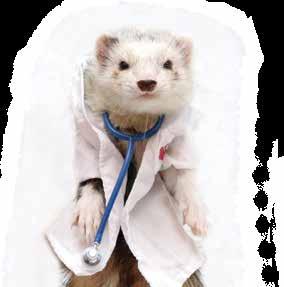
2 minute read
Ask the VET
It is hot out there! Your ferrets are very susceptible to extreme temperatures. It is important that you work to keep you and your ferrets cool and comfortable on those especially hot and humid days. Always keep fresh, clean, cool water available for your ferret and read these tips to surviving the summer.
Temperatures over 85°F can cause serious problems for ferrets. How do you know if your ferret is suffering from heat stroke and what should you do?
Advertisement
How do you cool down a ferret?
Believe it or not, bathing your ferret too much will actually make ferrets with water from a spray bottle and letting a fan blow over them.
The symptoms of a ferret that is suffering from being too hot typically include panting, lethargy, a bright red nose and dark red foot pads. If you suspect that your ferret is overheated, quickly cradle its head with a cool wet rag and wrap its body with a cool wet towel, and call your vet for further instruction.
Your ferrets’ cage could be in harm’s way!
Make sure your ferrets’ cages are not in direct sunlight from windows to avoid a greenhouse effect. Direct sunlight can easily increase the temperature of your ferrets’ cage by 10 degrees or more!
Be sure to check the cage throughout the day to see where the sun’s rays land. Make sure that their water dish and sleeping quarters are never getting direct sunshine.
Ferrets lick themselves to help shed winter coats.
This causes hairballs. You can help reduce the need for them to lick by brushing them with a soft bristle brush once a week. Ferret Lax is the perfect remedy for both eliminating existing hairballs and preventing the formation of new ones. It also aids in removing other items which may have been accidentally ingested.
Believe it or not, bathing your ferret too much will actually make him smell worse! In addition, your ferret's natural oils help its skin to stay moisturized and it coat to stay shiny. You...
• Ferrets cannot sweat. You can help them sweat and benefit from the cooling effects of sweat by misting your ferrets with water from a spray bottle and letting a fan blow over them.
•The perfect temperature for ferrets is the low 70s. Air conditioning vents or fans should never be in direct line of their cages to avoid them becoming too cold.
•Freeze water in empty plastic pop bottles or milk jugs and wrap them in towels. Place them in the cage to provide your ferret with a cool place to lounge as the water thaws. (Test this one out under supervision first to ensure your ferret doesn’t chew the plastic of the bottle.)
•Soak a washcloth, roll and freeze. Place it in your ferrets’ cage to thaw.
•Let your ferrets splash in a cool bath or shallow pet pool. The Marshall 24” Ferret Swimming Pool is perfect for this.
•If you don’t mind your ferrets splashing where they drink, toss a couple of ice cubes in their water bowl. They’ll have fun.
DID YOU KNOW?
Although rare, ferrets can get heartworms from the bite of an infected mosquito. Ferrets are similar to dogs in their susceptibility to heartworm infections, but their symptoms are more similar to those seen in cats. Symptoms of heartworm disease in ferrets include decreased activity level, coughing, trouble breathing and overall weakness. Talk to your ferret’s veterinarian about preventing heartworm disease in your furry friend.






